5 books about Formalism
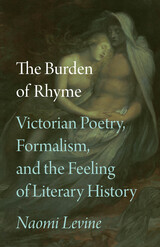
The Burden of Rhyme
Victorian Poetry, Formalism, and the Feeling of Literary History
Naomi Levine
University of Chicago Press, 2024
A major new account of Victorian poetry and its place in the field of literary studies.
The Burden of Rhyme shows how the nineteenth-century search for the origin of rhyme shaped the theory and practice of poetry. For Victorians, rhyme was not (as it was for the New Critics, and as it still is for us) a mere technique or ahistorical form. Instead, it carried vivid historical fantasies derived from early studies of world literature. Naomi Levine argues that rhyme’s association with the advent of literary modernity and with a repertoire of medievalist, Italophilic, and orientalist myths about love, loss, and poetic longing made it a sensitive historiographic instrument. Victorian poets used rhyme to theorize both literary history and the most elusive effects of aesthetic form. This Victorian formalism, which insisted on the significance of origins, was a precursor to and a challenge for twentieth-century methods. In uncovering the rich relationship between Victorian poetic forms and a forgotten style of literary-historical thought, The Burden of Rhyme reveals the unacknowledged influence of Victorian poetics—and its repudiation—on the development of modern literary criticism.
The Burden of Rhyme shows how the nineteenth-century search for the origin of rhyme shaped the theory and practice of poetry. For Victorians, rhyme was not (as it was for the New Critics, and as it still is for us) a mere technique or ahistorical form. Instead, it carried vivid historical fantasies derived from early studies of world literature. Naomi Levine argues that rhyme’s association with the advent of literary modernity and with a repertoire of medievalist, Italophilic, and orientalist myths about love, loss, and poetic longing made it a sensitive historiographic instrument. Victorian poets used rhyme to theorize both literary history and the most elusive effects of aesthetic form. This Victorian formalism, which insisted on the significance of origins, was a precursor to and a challenge for twentieth-century methods. In uncovering the rich relationship between Victorian poetic forms and a forgotten style of literary-historical thought, The Burden of Rhyme reveals the unacknowledged influence of Victorian poetics—and its repudiation—on the development of modern literary criticism.
[more]
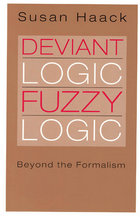
Deviant Logic, Fuzzy Logic
Beyond the Formalism
Susan Haack
University of Chicago Press, 1996
Initially proposed as rivals of classical logic, alternative logics have become increasingly important in areas such as computer science and artificial intelligence. Fuzzy logic, in particular, has motivated major technological developments in recent years.
Susan Haack's Deviant Logic provided the first extended examination of the philosophical consequences of alternative logics. In this new volume, Haack includes the complete text of Deviant Logic, as well as five additional papers that expand and update it. Two of these essays critique fuzzy logic, while three augment Deviant Logic's treatment of deduction and logical truth. Haack also provides an extensive new foreword, brief introductions to the new essays, and an updated bibliography of recent work in these areas.
Deviant Logic, Fuzzy Logic will be indispensable to students of philosophy, philosophy of science, linguistics, mathematics, and computer science, and will also prove invaluable to experienced scholars working in these fields.
Susan Haack's Deviant Logic provided the first extended examination of the philosophical consequences of alternative logics. In this new volume, Haack includes the complete text of Deviant Logic, as well as five additional papers that expand and update it. Two of these essays critique fuzzy logic, while three augment Deviant Logic's treatment of deduction and logical truth. Haack also provides an extensive new foreword, brief introductions to the new essays, and an updated bibliography of recent work in these areas.
Deviant Logic, Fuzzy Logic will be indispensable to students of philosophy, philosophy of science, linguistics, mathematics, and computer science, and will also prove invaluable to experienced scholars working in these fields.
[more]
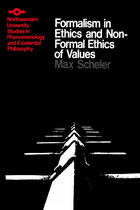
Formalism in Ethics and Non-Formal Ethics of Values
A New Attempt toward the Foundation of an Ethical Personalism
Max Scheler
Northwestern University Press, 1973
A lengthy critique of Kant's apriorism precedes discussions on the ethical principles of eudaemonism, utilitarianism, pragmatism, and positivism.
[more]
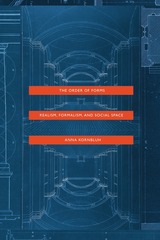
The Order of Forms
Realism, Formalism, and Social Space
Anna Kornbluh
University of Chicago Press, 2019
In literary studies today, debates about the purpose of literary criticism and about the place of formalism within it continue to simmer across periods and approaches. Anna Kornbluh contributes to—and substantially shifts—that conversation in The Order of Forms by offering an exciting new category, political formalism, which she articulates through the co-emergence of aesthetic and mathematical formalisms in the nineteenth century. Within this framework, criticism can be understood as more affirmative and constructive, articulating commitments to aesthetic expression and social collectivity.
Kornbluh offers a powerful argument that political formalism, by valuing forms of sociability like the city and the state in and of themselves, provides a better understanding of literary form and its political possibilities than approaches that view form as a constraint. To make this argument, she takes up the case of literary realism, showing how novels by Dickens, Brontë, Hardy, and Carroll engage mathematical formalism as part of their political imagining. Realism, she shows, is best understood as an exercise in social modeling—more like formalist mathematics than social documentation. By modeling society, the realist novel focuses on what it considers the most elementary features of social relations and generates unique political insights. Proposing both this new theory of realism and the idea of political formalism, this inspired, eye-opening book will have far-reaching implications in literary studies.
Kornbluh offers a powerful argument that political formalism, by valuing forms of sociability like the city and the state in and of themselves, provides a better understanding of literary form and its political possibilities than approaches that view form as a constraint. To make this argument, she takes up the case of literary realism, showing how novels by Dickens, Brontë, Hardy, and Carroll engage mathematical formalism as part of their political imagining. Realism, she shows, is best understood as an exercise in social modeling—more like formalist mathematics than social documentation. By modeling society, the realist novel focuses on what it considers the most elementary features of social relations and generates unique political insights. Proposing both this new theory of realism and the idea of political formalism, this inspired, eye-opening book will have far-reaching implications in literary studies.
[more]
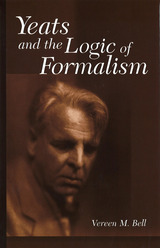
Yeats and the Logic of Formalism
Vereen M. Bell
University of Missouri Press, 2006
Yeats and the Logic of Formalism deals with formalism as a philosophy in Yeats’s works and how that in turn affects both his art and his social vision. Vereen M. Bell’s linking of “formalism” and “philosophy” stems from a meditation by Yeats in a manuscript note: “I am always feeling a lack of life's own values behind my
thought. They should have been there before the stream began, before it became necessary to let the work create its values.” In Bell’s reading, formalism is not simply a philosophy of art but a philosophy of life as directed by art—existential at its source and unpredictably political in its applications.
Bell examines formalism as an ideology and evaluates its credibility in Yeats's practice in relation to other theoretical discourses and in the context of the turbulent cultural and historical circumstances under which Yeats worked. He invokes and elaborates upon Edward Said’s reading of Yeats as a special kind of colonial subject. He revisits in this context the issue of how much Yeats and Nietzsche have in common and argues, in the manner of J. Hillis Miller, that the primordial is for Yeats what formalism ultimately sets itself against.
Yeats and the Logic of Formalism mediates between older, traditional readings and recent materialist critiques of Yeats’s work in an effort to restore a balanced perspective. The author centers most of his discussion on Yeats's poems as acts of thought, both as poetry and as a body of ideas. Within this context he
maintains that Yeats as a modernist is essentially aligned with Wallace Stevens in the project of creating supreme fictions. Formalism in this function, he argues, is an ideology without content. As such, it compelled Yeats to remain unsettled in his outlook. On the other hand, it enabled him, as Richard Ellmann has pointed out, to continually adapt and readapt "himself to the changing conditions of his body and mind and of the outside world."
[more]
READERS
Browse our collection.
PUBLISHERS
See BiblioVault's publisher services.
STUDENT SERVICES
Files for college accessibility offices.
UChicago Accessibility Resources
home | accessibility | search | about | contact us
BiblioVault ® 2001 - 2024
The University of Chicago Press









